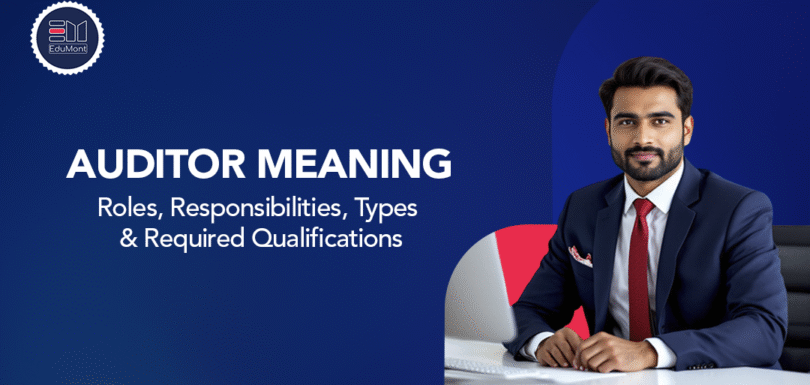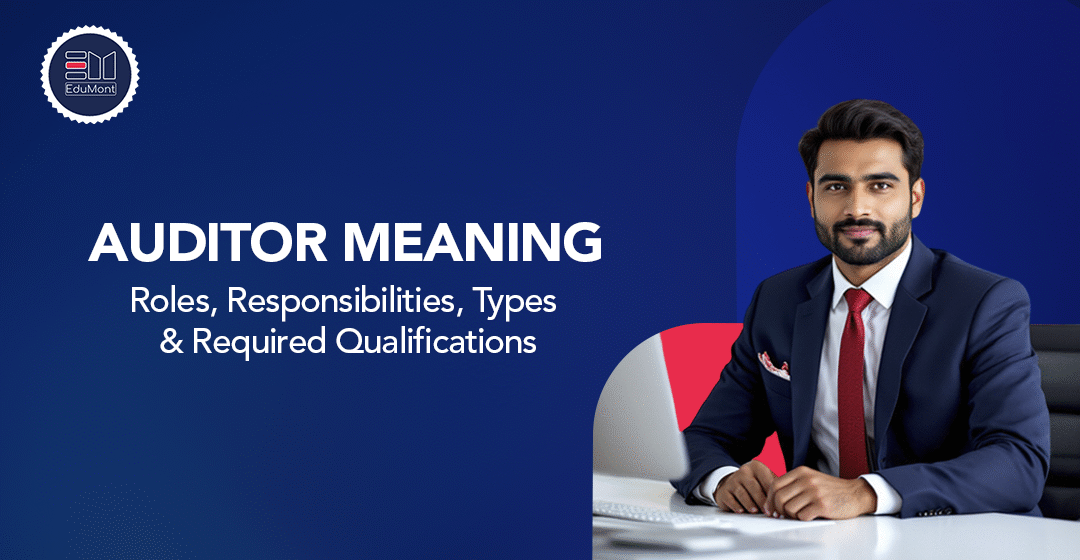Auditor Meaning: Roles, Responsibilities, Types & Qualifications
Auditing is a vital part of every financial system. It ensures that a company’s accounts are accurate, reliable, and compliant with established standards. For students and professionals pursuing careers in accounting or finance, understanding the meaning of an auditor, their roles, responsibilities, types, and qualifications is essential. What Is an Auditor? An auditor is a qualified professional who examines, evaluates, and verifies the financial records of an organization. The primary goal of auditing is to ensure that the financial statements present a true and fair view of the company’s financial position. In simple terms, an auditor acts as an independent examiner who checks whether the accounts prepared by a business are accurate and comply with accounting principles, tax laws, and regulatory requirements. Main Objectives of Auditing Verification of Accuracy – To confirm that all financial transactions are correctly recorded. Detection of Errors and Frauds – To identify any intentional or unintentional mistakes. Compliance – To ensure adherence to accounting standards and legal requirements. Improvement in Controls – To assess the effectiveness of internal systems and recommend improvements. Roles of an Auditor The role of an auditor goes beyond checking numbers. It includes examining internal processes, assessing risk, and advising management on financial efficiency. Key Roles Include: Verification of Financial Statements: Ensuring that the Balance Sheet and Profit & Loss Account are accurate. Evaluation of Internal Controls: Reviewing company systems to identify weaknesses or irregularities. Risk Assessment: Identifying areas prone to fraud or mismanagement. Reporting: Issuing an audit report expressing an opinion on the financial statements. Advisory Role: Suggesting corrective measures for better accounting practices and compliance. Responsibilities of an Auditor Auditors must perform their duties with integrity, objectivity, and professional competence. An auditor’s responsibilities are defined by — accounting laws, auditing standards, and ethical frameworks. Major Responsibilities Planning and Conducting Audits: Designing audit procedures suited to the size and nature of the organization. Maintaining Independence: Avoiding any conflict of interest that could affect judgment. Documenting Evidence: Keeping records of all checks and verifications performed during the audit. Reporting Findings: Submitting an unbiased audit report to shareholders or management. Confidentiality: Respecting the confidentiality of client information. Compliance with Standards: Following Generally Accepted Auditing Standards (GAAS) or International Standards on Auditing (ISA). Types of Auditors and Their Descriptions Internal Auditor – Works within the organization to evaluate internal controls and risk management processes. External Auditor – An independent professional who examines financial statements for accuracy and compliance with accounting standards. Government Auditor – Conducts audits of government departments and public sector organizations to ensure transparency and proper use of funds. Forensic Auditor – Specializes in investigating fraud, embezzlement, or financial misconduct within organizations. Tax Auditor – Reviews tax filings and ensures compliance with tax laws and regulations. Information Systems Auditor – Focuses on auditing IT systems, data security controls, and information management processes. Qualifications Required to Become an Auditor To practice as an auditor, strong academic credentials and professional certifications are essential. The exact requirements vary across countries, but the following are commonly recognized: Educational Requirements A bachelor’s degree in Accounting, Commerce, Finance, or Business Administration. A solid understanding of auditing principles, taxation, and financial management. Professional Qualifications US CPA (Certified Public Accountant) – Recognized globally for expertise in auditing, taxation, and financial reporting. US CMA (Certified Management Accountant) – Focuses on management accounting, analysis, and decision-making. Other regional credentials like CA (Chartered Accountant) or ACCA (Association of Chartered Certified Accountants) also qualify individuals for auditing roles. Key Skills for Auditors Analytical and critical-thinking skills Attention to detail Ethical judgment Strong communication and reporting abilities Knowledge of accounting software and auditing tools Importance of Auditing in Modern Business Auditing builds trust between a company and its stakeholders. Investors, regulators, and management rely on audited financial statements to make informed decisions. A well-conducted audit strengthens transparency, minimizes risk, and ensures compliance—making it indispensable for sustainable business growth. Build a Professional Auditing Career with Edumont Classes A successful career in auditing begins with a strong educational foundation and recognized international credentials. Edumont Classes offers specialized coaching for US CPA and US CMA aspirants, designed to equip students with in-depth knowledge of auditing, taxation, and financial reporting. With expert faculty, comprehensive study materials, and a global learning approach, Edumont helps you advance from academic understanding to professional mastery. 🎓 Start your journey to becoming a qualified auditor with Edumont Classes today.








